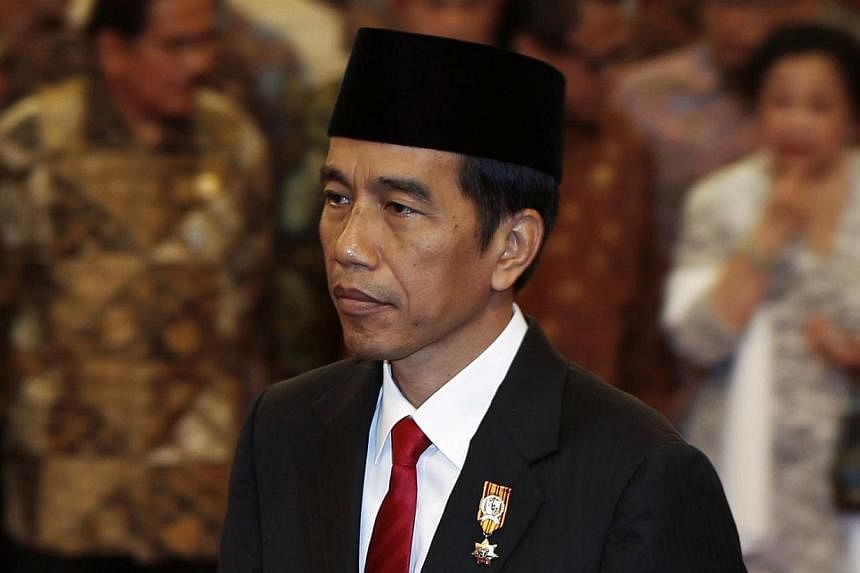At the inaugural ceremony on Oct 20, President Joko Widodo (Jokowi) made a brief speech stating that he wanted to revive the historical position of Indonesia as a maritime power.
Since then, being a maritime power has been identified as the "core" of Jokowi's foreign policy.
In fact, Jokowi first mentioned the idea of "tol laut" (maritime toll road) during the presidential debate in May. What he meant by the term was to connect the western port of Belawan and the eastern port of Sorong in order to promote interactions between eastern and western Indonesia. In his view, the large disparity in the prices of goods in Java and Papua is due to the under-development of maritime transport.
To overcome this, Indonesia requires large ships and harbours with modern facilities.
Vice-President Jusuf Kalla noted that Indonesia would have 24 deep new and old harbours. Old harbours would be upgraded to meet modern and international standards. With international harbours in western and eastern Indonesia, maritime trade would improve and the hope is that in a short time, Indonesia would become a maritime power.
When Jokowi announced his Cabinet, he established a new coordinating ministry of maritime affairs and appointed Dr Indroyono Susilo to head it. The four ministries under him are: Maritime and Fishery, Tourism, Transport, and Energy and Mining. The aim is to enhance domestic fish production and help Indonesia's 2.4 million fishermen modernise.
In addition, this coordinating ministry would exploit the oil and gas fields, and develop national and international maritime transport, which in turn would make Indonesia a "global maritime centre". The plan that the President presented was, however, simple, focused on economic matters and did not give much detail. What is missing is the political, military and strategic aspects usually associated with a maritime power.
As for Coordinating Minister Indroyono, he wants to develop Indonesia into a global maritime centre within 10 years. That would call for large amounts of capital and advanced technology to build the maritime infrastructure. To implement this plan, Indonesia needs to involve the private sector and secure foreign assistance.
One week after Jokowi's announcement, US Secretary of the Navy Roy Mabus visited Medan to meet the crew of the USS Rodney M. Davis, a guided missile frigate that had just conducted a joint exercise with the Indonesian navy. Mr Mabus stated his govern-ment's support for Jokowi's maritime power proposal and expressed American willingness to improve maritime cooperation between the two countries.
China did not immediately express its interest in Jokowi's project but on Nov 2, a few days after the US statement, Chinese Foreign Minister Wang Yi visited Jakarta and met Jokowi and Foreign Minister Retno Marsudi. Mr Wang announced that China would participate actively in Indonesia's aim to be a maritime power, largely by assisting with infrastructure development.
Jokowi was also quoted as saying that "Indonesia is on the way of developing into a maritime power, while China proposes to build the 21st century maritime Silk Road; the two initiatives highly fit with each other".
In fact, in October last year, when Chinese President Xi Jinping delivered his speech in the Indonesian Parliament, he talked about the new maritime Silk Road and offered Indonesia and other Asean states the use of China-Asean cooperation funds for closer maritime cooperation. There was no clear response from Indonesia then, so the matching of these two maritime projects can be seen as a new development.
More significantly, at the Apec meeting in Beijing last month, Jokowi agreed to join the newly established China-led Asia Infrastructure Investment Bank, seen as a rival of the World Bank and the Asia Development Bank. Jokowi also invited Mr Xi to visit Indonesia next year for the 60th anniversary of the Afro-Asian Conference and the 65th anniversary of the establishment of diplomatic ties between Jakarta and Beijing. These are seen as indications that Indonesia under Jokowi is moving closer to China.
Nevertheless, many doubt that Jokowi's dream of maritime power will be realised soon as there are many difficulties and the vision is still sketchy. Initially, Jokowi was interested in developing maritime transport within the Indonesian archipelago, but later the concept was transformed into becoming a maritime power which is beyond the initial proposal of a "sea toll road" or "maritime transportation system". That will require a lot of infrastructure investment, which China appears ready to help with.
However, as Indonesia claims to be "independent and active" in its foreign policy, it seems unlikely it will rely only on China for the maritime projects.
Jakarta also wants to be the leader in the South-east Asian region and is thus concerned about the unresolved territorial disputes in the South China Sea.
Jakarta would like to act as an intermediary between the parties involved and further cooperation with Beijing would therefore also depend on what China does on this issue.
Equally important is the Indonesian Parliament, which is dominated by the opposition parties. Some have not been enthusiastic about Jokowi's idea of a sea toll road. One commented that the different prices between Java and Papua were not due to sea transportation, but land transportation which is not developed. In some areas, the goods have to be transported by air, which is expensive.
The writer is a visiting senior fellow at the Institute of Southeast Asian Studies.

